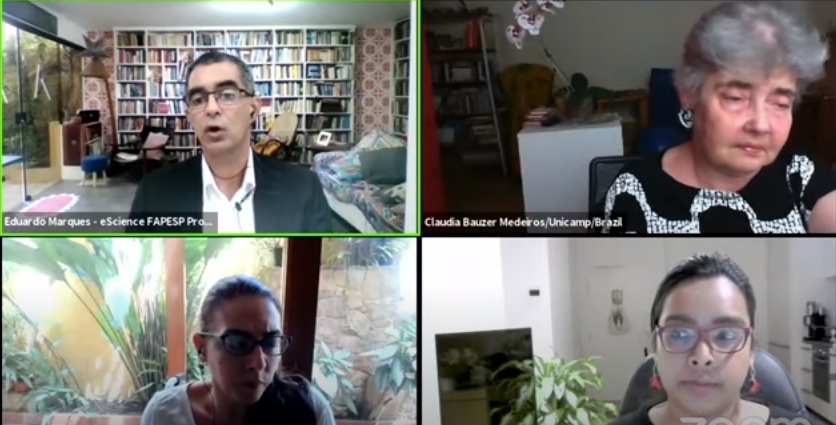


Scientists affiliated with institutions in Brazil and elsewhere presented research findings that highlighted the importance of data sharing in the fight against COVID-19 (image: screenshot taken during the webinar).
Published on 01/24/2022
By José Tadeu Arantes | Agência FAPESP – The COVID-19 pandemic has evidenced the benefits of data sharing, the importance of promoting local, national, and international scientific collaboration, and the need for science-based decisions. Recent scientific and technological developments in data production, storage, processing, and analysis have played a key role in the period, as noted by participants in a webinar hosted by FAPESP on “Data Science for Social Good” in late November 2021.
The online seminar discussed how advances in eScience and Data Science can boost the development of social research and help improve public policy, featuring presentations by Iryna Kuchma, Open Access Program Manager at Electronic Information for Libraries (EIFL); Lorena Barberia, a professor and researcher in the Department of Political Science at the University of São Paulo (USP); and Priyanka Pillai, a research data specialist focusing on health informatics at the University of Melbourne (Australia).
The discussion was moderated by Claudia Bauzer Medeiros, a professor in the Institute of Computing at the State University of Campinas (UNICAMP) and a member of the steering committee for the FAPESP Research Program in eScience and Data Science, and Eduardo Leão Marques, a professor in the Department of Political Science at USP and also a member of the steering committee for the FAPESP Research Program in eScience and Data Science. FAPESP’s Scientific Director, Luiz Eugênio Mello, welcomed the participants and emphasized the importance of the topic.
Kuchma spoke about the UNESCO Recommendation on Open Science. Adopted in late November by the General Conference of the United Nations Educational, Scientific and Cultural Organization (UNESCO), the Recommendation stresses that “greater access to scientific processes and outputs can improve the effectiveness and productivity of scientific systems by reducing duplication costs in collecting, creating, transferring and reusing data and scientific material, allowing more research from the same data, and increasing the social impact of science by multiplying opportunities for local, national, regional and global participation in the research process”. Kuchma’s presentation addressed the concept of data reuse at length and offered several examples.
The next presentation was entitled “The impact of data collection and data accuracy on the evaluation of COVID-19 containment and mitigation policies in Brazil”. It was delivered by Barberia, who described two highly relevant initiatives: the Solidarity Research Network on Public Policy and Society and the COVID-19 BR Observatory.
Among other aspects of the topic, she highlighted politicization via social media, which greatly increases the difficulty of obtaining objective information on government policy, citizen behavior, and health outcomes.
Working and living in a quite different social and political context, Pillai asked how meaningful public engagement can enhance data-driven health policies, especially since data bridges are built to connect public health bodies, clinical research, laboratory research, and the behavior and responses of the general public. The main areas she focused on were harmonization of definitions, data sharing agreements involving different clinical units and departments, care protocols, and consent.
A complete recording of the webinar “Data Science for Social Good” is at: https://www.youtube.com/watch?v=vwzxqRMB3bE.
Source: https://agencia.fapesp.br/37794